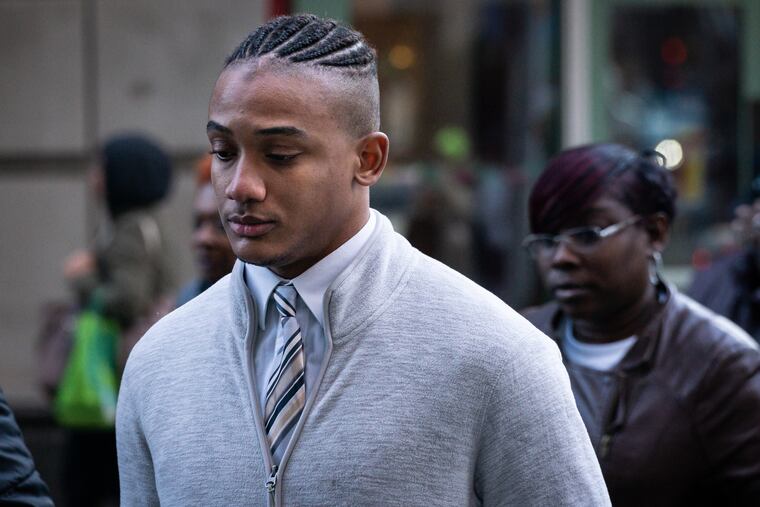Undercharging Rittenhouse stabber raises worrying questions about Larry Krasner | Opinion
Murder charges were dropped against Michael White, who is on trial for stabbing Sean Schellenger in Rittenhouse Square.

To prove murder of the first degree under Pennsylvania law, it is necessary for the prosecution to prove that the defendant willfully, deliberately, and with premeditation killed another. Pennsylvania case law has consistently held that the requirements of deliberation and premeditation are met whenever there is a conscious purpose to bring about death. The cases further hold that the specific intent to kill can be formulated in a fraction of a second. And, because a person generally intends the consequences of his act, a specific intent to kill may be inferred from the fact that the accused used a deadly weapon to inflict injury on a vital part of the victim’s body.
The foregoing is the fundamental law that applies to homicides everywhere in Pennsylvania. Everywhere except, it appears, in District Attorney Larry Krasner’s Philadelphia.
Last year, Michael White was arrested for the stabbing death of real estate developer Sean Schellenger during a scuffle in Rittenhouse Square. The prosecution alleged that White had fatally stabbed Schellenger in the back as the two fought. Accordingly, White was properly charged with first-degree murder.
But then District Attorney Krasner withdrew the first-degree murder charge. Despite the clear inference of murderous intent raised by White’s use of a knife on a vital part of Schellenger’s body, Krasner stated that his office did not have enough evidence to prove first-degree murder. This questionable decision left the severely reduced charges of third-degree murder and manslaughter.
Last Friday, on the eve of trial, Krasner filed a motion requesting the court’s permission to drop the third-degree murder charge and proceed solely on manslaughter. In the motion, Krasner wrote that he believes a jury could accept that White stabbed Schellenger “under a sudden or intense passion from serious provocation or acting in unreasonable self-defense” and could find him guilty of voluntary manslaughter, but that those elements would be a legal defense to third-degree murder.
» READ MORE: Anatomy of a deadly clash
“The district attorney’s strategic and policy-based decision is that the most likely way to secure a just conviction for this killing is to proceed to trial with a lead charge of voluntary manslaughter,” Krasner wrote.
As with Krasner’s dropping of the first-degree murder charge, his motion bypasses the inconvenient truth that the prosecution’s evidence legally warrants a murder charge. While it might be easier for the prosecution to convict White of manslaughter than murder, that is no justification for not going to trial on the legally supported charge of murder. And the fact that defense counsel might argue that White acted under “passion from serious provocation” or in “unreasonable self-defense” is no reason for the prosecution to peremptorily surrender by dropping the murder charge.
Linda Schellenger, the victim’s mother, urged the court to deny Krasner’s ill-conceived motion and to keep the murder charge in the case. “Let the jury decide,” she said.
» READ MORE: My son was murdered. Why won’t DA Larry Krasner prosecute to the fullest extent of the law? | Opinion
She is absolutely correct. The alleged facts more than justify prosecuting White for first-degree (much less third-degree) murder, and the jury should be afforded the option of so deciding. After hearing all the evidence and the court’s instructions on the law of homicide, if the jury then wants to return a verdict of murder, manslaughter, or acquittal, it may do so. But the option of convicting for murder should not be denied the jury because the prosecution is reluctant to put up a fight or because defense counsel might present a defense.
On Monday, the court granted Krasner’s motion, and the murder charge was withdrawn. So now, having done the defense’s job for it, Krasner’s office will proceed to trial on the manslaughter charge alone. This is a disgrace.
Krasner has made clear that he does not want to overcharge defendants. That is a proper goal provided the charging decision is governed by the evidence and the law.
But to set aside the law and the evidence in order to undercharge a defendant as a matter of ease or convenience for the prosecution or because defense counsel might make a countervailing argument at trial is a gross dereliction of Krasner’s duty to the citizens of Philadelphia. And Krasner’s outrageous undercharging of Michael White once again raises the troubling questions of whose side is he on, and how much longer can Philadelphia afford to have a district attorney who proudly describes himself as a “public defender with power”?
George Parry is a former federal and state prosecutor. He is a regular contributor to the American Spectator and blogs at knowledgeisgood.net. Kignet1@gmail.com.